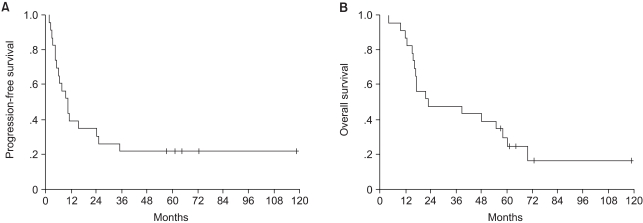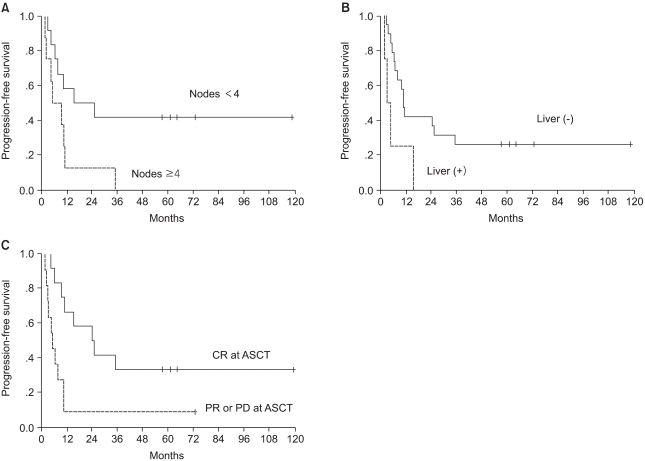Cancer Res Treat.
2005 Feb;37(1):24-30.
High-Dose Chemotherapy of Cyclophosphamide, Thiotepa, and Carboplatin (CTCb) Followed by Autologous Stem-Cell Transplantation for Metastatic Breast Cancer Patients: A 6-Year Follow-Up Result
- Affiliations
-
- 1Department of Internal Medicine, University of Ulsan College of Medicine, Asan Medical Center, Seoul, Korea. csuh@amc.seoul.kr
- 2Department of Internal Medicine, GyeongSang National University Hospital, Jinju, Korea.
Abstract
- PURPOSE
The benefit of high-dose chemotherapy (HDC) for metastatic breast cancer (MBC) is controversial. We evaluated the efficacy and safety of HDC with cyclophosphamide, thiotepa, and carboplatin (CTCb) followed by autologous stem-cell transplantation (ASCT) for MBC patients. MATERIALS AND METHODS: From September 1994 to December 1999, 23 MBC patients were enrolled. All the patients received 2 to 10 cycles of induction chemotherapy. Before transplantation, 12 patients were in complete response (CR), nine were in partial response (PR), and two had progressive disease (PD). The HDC regimen consisted of cyclophosphamide 1, 500 mg/m2/day, thiotepa 125 mg/m2/day and carboplatin 200 mg/m2/day intravenously for 4 consecutive days RESULTS: After ASCT, 13 patients (56%) had a CR, five (22%) had a PR, three (13%) had no change, while two (9%) showed a PD. Seventeen patients relapsed or progressed during the median follow-up of 78 months. The median progression-free survival (PFS) time was 11 months and the median overall survival (OS) time was 23 months. The 5-year PFS and OS rates were 22% and 25%, respectively. On the multivariate analyses, less than 4 involved lymph nodes was predictive of a better PFS and OS. CONCLUSION: HDC with CTCb for MBC has acceptable toxicity; however, this treatment does not show a survival benefit.
Keyword
MeSH Terms
Figure
Reference
-
1. Mick R, Begg CB, Antman KH, Korzun AH, Frei E 3rd. Diverse prognosis in metastatic breast cancer: Who should be offered alternative initial therapies? Breast Cancer Treat Res. 1989; 13:33–38.
Article2. Hryniuk W, Bush H. The importance of dose intensity in chemotherapy of metastatic breast cancer. J Clin Oncol. 1984; 2:1281–1288. PMID: 6387060.
Article3. Peters WP, Shpall EJ, Jones RB, Olsen GA, Bast RC, Gockerman JP, et al. High-dose combination alkylating agents with bone marrow support as initial treatment for metastatic breast cancer. J Clin Oncol. 1988; 6:1368–1376. PMID: 3047332.
Article4. Kennedy MJ, Beveridge RA, Rowley SD, Gordon GB, Abeloff MD, Davidson NE. High-dose chemotherapy with reinfusion of purged autologous bone marrow following dose-intense induction as initial therapy for metastatic breast cancer. J Natl Cancer Inst. 1991; 83:920–926. PMID: 1906111.
Article5. Antman K, Ayash L, Elias A, Wheeler C, Hunt M, Eder JP, et al. A phase ii study of high-dose cyclophosphamide, thiotepa, and carboplatin with autologous marrow support in women with measurable advanced breast cancer responding to standard-dose therapy. J Clin Oncol. 1992; 10:102–110. PMID: 1727912.
Article6. Peters WP, Jones RB, Vredenburgh J, Shpall EJ, Hussein A, Elkordy M, et al. A large, prospective, randomized trial of high-dose combination alkylating agents (CPB) with autologous cellular support (ABMS) as consolidation for patients with metastatic breast cancer achieving complete remission after intensive doxorubicin-based induction therapy (AFM). Proc Am Soc Clin Oncol. 1996; 16:121. (abstr 149).7. Nieto Y. The verdict is not in yet. Analysis of the randomized trials of high-dose chemotherapy for breast cancer. Haematologica. 2003; 88:201–211. PMID: 12604410.8. Lotz J, Cure H, Janvier M, Morvan F, Asselain B, Guillemot M, et al. High-dose chemotherapy (HD-CT) with hematopoietic stem cells transplantation (HSCT) for metastatic breast cancer (MBC): results of the French protocol PEGASE 04. Proc Am Soc Clin Oncol. 1999; 18:43a. (abstr 161).9. Madan B, Broadwater G, Rubin P, Edwards J, Long G, Chao NC, et al. Improved survival with consolidation high-dose cyclophosphamide, cisplatin and carmustine (HD-CPB) compared with observation in women with metastatic breast cancer (MBC) and only bone metastases treated with induction adriamycin, 5-fluorouracil and methotrexate (AFM): A phase III prospective randomized comparative trial. Proc Am Soc Clin Oncol. 2000; 19:48a. (abstr 184).10. Stadtmauer EA, O'Neill A, Goldstein LJ, Crilley PA, Mangan KF, Ingle JN, et al. The Philadelphia Bone Marrow Transplant Group. Conventional-dose chemotherapy compared with high-dose chemotherapy plus autologous hematopoietic stem-cell transplantation for metastatic breast cancer. N Engl J Med. 2000; 342:1069–1076. PMID: 10760307.
Article11. Stadtmauer EA, O'Neill A, Goldstein LJ, Crilley PA, Mangan KF, Ingle JN, et al. Conventional-dose chemotherapy compared with high-dose chemotherapy (HDC) plus autologous stem-cell transplantation (SCT) for metastatic breast cancer: 5-year update of the 'Philadelphia Trial' (PBT-1). Proc Am Soc Clin Oncol. 2002; 21:43a. (abstr 169).12. Crump M, Gluck S, Stewart D, Levine M, Pritchard K, Kirkbride P, et al. A randomized trial of high-dose chemotherapy (HDC) with autologous peripheral blood stem cell support (ASCT) compared to standard therapy in women with metastatic breast cancer: a National Cancer Institute of Canada (NCIC) clinical trial group study. Proc Am Soc Clin Oncol. 2001; 20:21a. (abstr 82).13. Biron P, Durand M, Roche H, Delozier T, Battista C, Fargeot P, et al. High dose thiotepa (TTP), cyclophosphamide (CPM) and stem cell transplantation after 4 FEC 100 compared with 4 FEC alone allowed a better disease free survival but the same overall survival in first line chemotherapy for metastatic breast cancer. Results of the PEGASE 03 French Protocol. Proc Am Soc Clin Oncol. 2002; 21:42a. abstr 167.14. Schmid P, Samonigg H, Nitsch T, Huebner G, Kreienberg R, Schultze W, et al. Randomized trial of up front tandem high-dose chemotherapy (HD) compared to standard chemotherapy with doxorubicin and paclitaxel (AT) in metastatic breast cancer (MBC). Proc Am Soc Clin Oncol. 2002; 21:43a. (abstr 171).15. Cho SH, Kim SW, Min YJ, Choi SJ, Kim JK, Kim TW, et al. High dose cyclophosphamide, thiotepa, and carboplatin followed by autologous peripheral stem cell rescue in patients with responsive metastatic or high-risk primary breast cancer. J Korean Cancer Assoc. 1998; 30:100–105.16. Suh C, Kim HJ, Kim SH, Kim S, Lee SJ, Lee YS, et al. Low-dose lenograstim to enhance engraftment after autologous stem cell transplantation: a prospective randomized evaluation of two different fixed doses. Transfusion. 2004; 44:533–538. PMID: 15043569.
Article17. Macdonald DR, Cascino TL, Schold SC Jr, Cairncross JG. Response criteria for phase II studies of supratentorial malignant glioma. J Clin Oncol. 1990; 8:1277–1280. PMID: 2358840.
Article18. Rahman ZU, Frye DK, Buzdar AU, Smith TL, Asmar L, Champlin RE, et al. Impact of selection process on response rate and long-term survival of potential high-dose chemotherapy candidates treated with standard-dose doxorubicin-containing chemotherapy in patients with metastatic breast cancer. J Clin Oncol. 1997; 15:3171–3177. PMID: 9336352.
Article19. Bezwoda WR, Seymour L, Dansey RD. High-dose chemotherapy with hematopoietic rescue as primary treatment for metastatic breast cancer: a randomized trial. J Clin Oncol. 1995; 13:2483–2489. PMID: 7595697.
Article20. Livingston R, Crowley J. Commentary on PBT-1 study of high-dose consolidation versus standard therapy in metastatic breast cancer. J Clin Oncol. 1999; 17(supple 11):22–24. PMID: 10630257.21. Berry DA, Broadwater G, Klein JP, Antman K, Aisner J, Bitran J, et al. High-dose versus standard chemotherapy in metastatic breast cancer: comparison of cancer and leukemia group b trials with data from the autologous blood and marrow transplant registry. J Clin Oncol. 2002; 20:743–750. PMID: 11821456.
Article22. Rowlings PA, Williams SF, Antman KH, Fields KK, Fay JW, Reed E, et al. Factors correlated with progression-free survival after high-dose chemotherapy and hematopoietic stem cell transplantation for metastatic breast cancer. JAMA. 1999; 282:1335–1343. PMID: 10527180.
Article23. Rizzieri DA, Vredenburgh JJ, Jones R, Ross M, Shpall EJ, Hussein A, et al. Prognostic and predictive factors for patients with metastatic breast cancer undergoing aggressive induction therapy followed by high-dose chemotherapy with autologous stem-cell support. J Clin Oncol. 1999; 17:3064–3074. PMID: 10506601.
Article
- Full Text Links
- Actions
-
Cited
- CITED
-
- Close
- Share
- Similar articles
-
- High-Dose Chemotherapy of Cyclophosphamide, Thiotepa and Carboplatin (CTCb) followed by Autologous Stem-Cell Transplantation as a Consolidation for Breast Cancer Patients with 10 or more Positive Lymph Nodes: a 5-Year follow-Up Results
- High-Dose Chemotherapy of Cyclophosphamide, Thiotepa, and Carboplatin (CTCb) with Autologous Peripheral Blood Stem Cell Transplantation for High-Risk Primary Breast Cancer and Metastatic Breast Cancer
- High Dose Chemotherapy with Ifosfamide, Carboplatin, and Etoposide Followed by Autologous Stem Cell Transplantation in Breast Cancer
- High Dose Cyclophosphamide, Thiotepa, and Carboplatin followed by Autologous Peripheral Stem Cell Rescue in Patients with Responsive Metastatic or High - Risk Primary Breast Cancer
- Tandem High-Dose Chemotherapy and Autologous Stem Cell Transplantation for High-Grade Gliomas in Children and Adolescents



